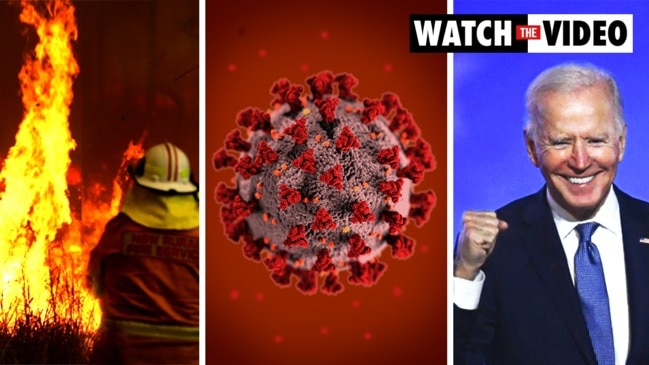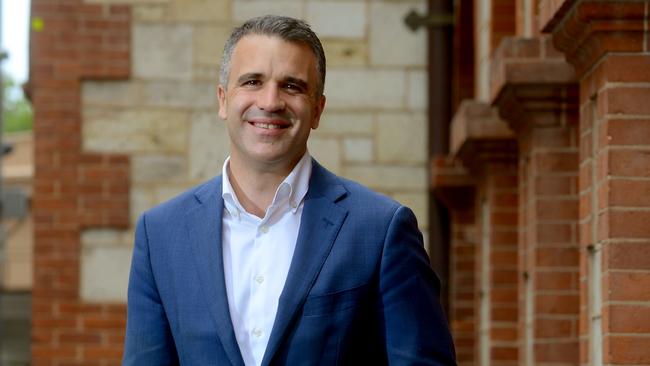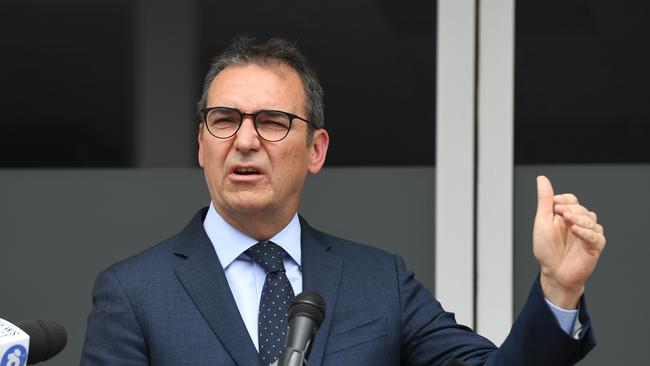Who benefits most from a chaotic year in state politics: Steven Marshall or Peter Malinauskas?
Ministers resigning, policy disasters and steady leadership amid the great crisis of our time. Political Editor Matt Smith analyses the fallout in state politics.

Opinion
Don't miss out on the headlines from Opinion. Followed categories will be added to My News.
If a week is a long time in politics, 2020 must have felt like an eternity for South Australia’s politicians.
In a year dominated by the coronavirus pandemic, it is easy to forget 2020 threw up a raft of headlines no one ever expected to see.
Political leaders across the country have generally received widespread support from the public.
This is particularly true in South Australia where, according to polls, Premier Steven Marshall started the year on rocky ground, but ended it as favourite to win a second term.
Opposition Leader Peter Malinauskas, on the other hand, would have been buoyed by polls in March – at the midway point of the election cycle – that had Labor leading 53-47, only for those numbers to do a complete reversal just six months later.
Instead of capitalising on good numbers earlier in the year and raising his profile, Mr Malinauskas and his team have mainly been forced to take a back seat. Despite a number of scandals and missteps by the government, the public has had an insatiable appetite for all news coronavirus-related and very little else.

This is not to suggest Mr Marshall does not deserve the turnaround in the polls. Mr Marshall’s 2020 will be defined by his response to the coronavirus pandemic.
He produced a near textbook example of how to handle a global pandemic – without a textbook. Mr Marshall consistently relied on health advice in a move that served him well.
There have been hiccups including, but not limited to, turning people back at the NSW border on the eve of Christmas, putting the state into an unnecessary lockdown and breaches in the medi-hotel scheme.
But in the main the response has been measured, guided by health advice and not politicised.
In May, respected economists predicted coronavirus lockdowns would destroy the jobs of a staggering 66,000 South Australians and blow a $10 billion hole in the local economy this year alone. However, SA ended the year with the lowest unemployment rate of all states in the nation, albeit with question marks over what will happen when safety nets, including JobKeeper, are eventually removed in full.
SA has also showed its first signs in 20 years of reversing the ‘brain drain’, a key plank in Mr Marshall’s pre-election pledge to grow the state’s population. So beyond coronavirus, what has gone wrong?

Specialised visas – called designated migration agreements – that had promised to give SA a fighting chance at securing highly skilled migrants are already subject to a major overhaul due to a lack of interest.
A planned overhaul of bus routes, that would have led to the removal of almost 200 stops, was a PR disaster that was scrapped on the same day planned Service SA closures were taken off the table.
The regulation of gel blasters triggered an outpouring of anger from those who use and sell them.
Killing off the Adelaide 500 had revheads fired up and Mr Malinauskas raring to go with a policy to save it.
In any other year the loss of a minister would be regarded as a headache. But in 2020, Mr Marshall contended with the resignation of three ministers following two separate travel scandals.
He also accepted the resignation of Upper House president Terry Stephens, whose housing arrangement instigated an inquiry into a controversial country members’ allowance.
Before that Mr Marshall was forced to sack rising star of the party Sam Duluk, who is subject to a court case after allegedly slapping a colleague on the bottom during a Christmas party in Parliament House last year.
Mr Stephens’ resignation sparked a factional brawl for his seat with Mr Marshall’s choice, Jing Lee, losing out to John Dawkins.
Three federal Liberal MPs, from the conservative side, wrote to the party’s hierarchy asking for an investigation into Ms Lee’s links to China – a move slammed by powerful moderate figures of the party including Simon Birmingham, Christopher Pyne and Mr Marshall.
The factional battles highlight the fact that although some things change, some stay the same.
The government has also been forced to deal with some of the most horrific cases of abuse the state has seen, such as revelations two different men got two different 13-year-old girls, both in state care, pregnant.
The case of Annie Smith – the 54-year-old with cerebral palsy who died in April after being left to sit in a cane chair 24 hours a day for what police allege could have been a year – is also one the state will never forget.
This year has thrown up challenges no single government would have ever feared they would need to face in a single year. Like most of us, it is fair to assume the State Government will be happy to say goodbye to 2020.




